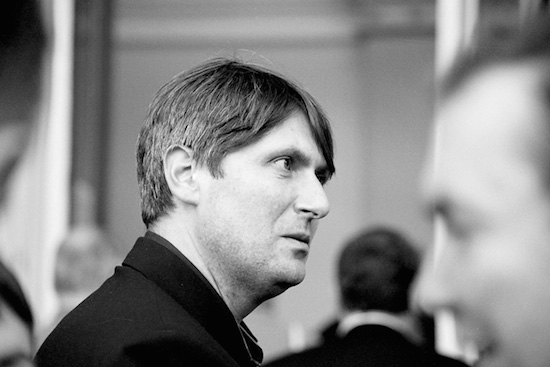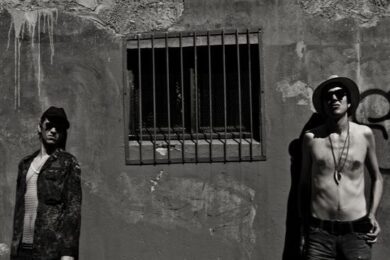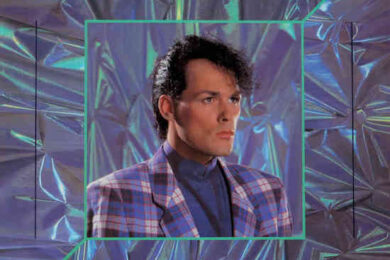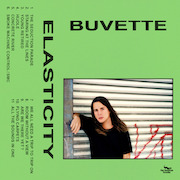Most of my generation know Simon Armitage’s work because they’ve heard the people who now populate their Facebook feed badly read it out loud in GCSE English class. He is a name that is near-universally recognised in a way that, both, goes beyond and is ultimately synonymous with UK Poetry. He was ‘poet of the Millennium’, has had his poems chiselled in to huge rocks across the Pennines and he’s published over 20 collections in 25 years. But, on reading his new selected poems – Paper Aeroplane – I was surprised at how much of his work I didn’t know.
He’s written about the Columbine shootings and 9/11, yet when he first started writing his work was praised for its humour, its fun and its sense of celebration. I asked him how being a public poet has changed his poetry, what violence means to him and the personal significance of pies so big you can dive in to them.
You wrote recently in the Poetry Review of the importance of having your own room as a young man, with a view over the backstreets of Marsden, was this solitude where your poetry sprung from?
It’s difficult to know, because it was so long ago. There was a sense that the world was going past very quickly and I was someone who needed time to think things over. My family are very chatty and quick-witted, maybe there was a sense that I couldn’t join in the way I wanted to and the poems were my way of going upstairs and coming back down twenty five years later to say “Ah ha!”
It seems similar to Alan Bennett’s way of writing, covering the different facets of the huge characters his parents were over many years.
I think that’s true. My Dad is a great extrovert, well known locally, never short of something to say and a way of saying it. Maybe I was looking for my version on that. I was quite an introspective kid, quite happy to spend time on my own, especially out the back door of the house which, essentially, opened up on to the Moors, that was both a landscape and a mind set. This view out of the window was a really privileged view of the inner working of the village and the stories began to occur.
I was also a bit truculent as a kid and bit contrary, and poetry was a natural alternative, it wasn’t something other people were doing, it was dissenting, secretive, a bit weird. I was looking for that.
Do you still feel there’s quite a lot of material there – through that window – that you will revisit, or have you wrung it out for all its worth?
A reporter came up the other day and I gave her a tour of Marsden and Huddersfield, and I realised every couple of minutes I was pointing out the window saying “I’ve got a poem about that, and that, and that”. But it isn’t just the topographical things, it became a working tool. I was talking about that window being a template – a framing device for experience. Although I do travel a lot and I write a lot of travel poetry, that locality provides a model, a filter that the poems travel through. It is quite hard to describe – it’s what I write with.
When I was reading reviews of Kid I came across a lot of words which you don’t often see in poetry reviews, words like ‘enjoyable’, ‘joyful’ and ‘fun’. Was this sense of ‘fun’ something you were conscious of when writing it?
No, I don’t think it was. It’s like your accent – you don’t think you have one, other people notice it. I recognise in those early pieces there is an exuberance that partly comes out of an innocence. At that point, I didn’t feel any entitlement of being published and being considered a poet was bordering on the fantastical. I think when you approach the writing in that frame of mind, I think the world seems like an astonishing place. There was a lot of celebration, especially of the ordinary. I hope, despite the cynicism that comes with old age, that feeling is still in my work.
I’ve always said the one thing to avoid at all costs in writing is wisdom – the idea of a sage poet speaking from knowledge. My work has always been open-eyed – I remember reading in a review that I had a “child’s eye”, which I’m not sure was meant as a compliment or not.
There’s a lot of underlying violence in your poems – to others and to the self – but reading your selection one of my favourites was from Killing Time, your 1,000 line long poem about 1999, where violence is addressed indirectly. In the selection, the gunmen of the Columbine High School shooting hand out flowers to classmates instead of killing them.
I think, initially, it was a reaction to working as a probation officer in Manchester. I saw some terrible things, I wrote reports on macabre incidents and, on a day to day basis, saw troubling instances of violence to which I had no answer. You often felt you weren’t making any difference. It was very different from my upbringing but it was constant in my working life – a type of jaundiced reality. I think it fed in to the work, even on occasion I was throwing it out to the readers to say “Well, what do you make of this?”
I’m conscious that at times I am using violence in poems to make contact with other human beings. I felt that we were pretty sleepy as a species, and that a good jolt of a primitive human emotion could do the trick of waking people up. I also think there is an element there of growing up in the Thatcher years in the 70’s and 80’s, which were particularly violent times. In later poems, even though that violence is still there, it is more mediated. I think that is what is going on in that poem in Killing Time. It is still prevalent, but maybe I am digging it out of the classical sources. I see it as war than personal violence, but there is a connection between the two – if you can’t get it right in town, you’re not going to get it right across international boundaries.
I suppose that we do live in violent times, but that violence is becoming more remote; a person doesn’t have to be present to inflict violence on other people.
I think that’s very true, we are inoculated against and have exported a lot of it thousands of miles away. I mean we’re almost in a Third World War situation now, but I am convinced our daily lives are a lot less violent.
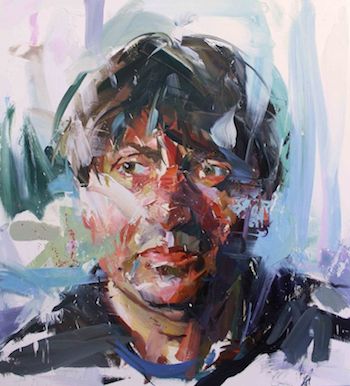
What was it like to be asked to be ‘The Poet of the Millennium’? Did you feel under pressure to make a huge statement — how do you deal with that?
At the time I felt a certain amount of responsibility, and I knew people would be looking at Killing Time and draw conclusions from it. But then I tend to do what I always do – retreat in to my head and then, in the end, it is between you and the page. I tried to write a poem on the modern media and the way our appetite for news is self serving, which I felt was important. I think someone at The Times said I had written “a poison pen letter for the age”, which I wanted to put on the back of the book.
At the time I think they were expecting something soft and fluffy that rhymed, not expecting that piece I produced, which had its roots in Louis MacNeice’s Autumn Journal. Perhaps that was not what people were looking for – not even the people who commissioned it.
Like a lot of people, I first came across your work at GCSE level. Has being involved in the syllabus changed you as a poet?
I’m convinced it hasn’t changed my writing. Being on the syllabus is coincidental: it is a coincidence that my poetry and what is needed for English overlap, and I say to students that these poems were not meant to be studied in this sort of environment. But, I think it is a great privilege.
What I like about being part of the syllabus is two fold: first is that it was around that time of being fourteen that I first came in to contact with poetry, it’s a place where poetry can do well; second, I also like the fact that students aren’t bogged down in literary criticism and they will talk about a poem like a film they saw. It is a great honour really – poets want readers, some say they don’t, but of course they do.
I get an extraordinary amount of letters from teachers that the poems have opened somebody’s eyes, and it is often a student who hasn’t been interested in other things, often a lot of lads who have been coasting through school, and the poems have alerted them to something. That’s satisfying, I recognise myself in those comments.
You’re also a prolific translator. I wonder when it was in your career that you decided to take on translation, was it something you were always interested in?
That’s an interesting question – it wasn’t anything I could have done straight off the bat. I needed confidence that comes with being published, and experience that comes with writing. With Gawain, deciding that was what I wanted to do for the next 3-4 years of my life, signing all of the contracts and being very committed to it, I still remember sitting down that first morning thinking “What the fuck have I done? I have no idea if I can do this.”
You need a certain amount of naivety but encouragement from other work. I had seen Heaney doing Beowulf, and Hughes doing Ovid – Hughes even did a few chapters of Gawain which, of course, he never finished. These were all seminal texts to me. And I wanted to bring them back in to poetry – faithful, academic translations tend to leave that out.
I especially enjoyed the selections from your most recent collection Seeing Stars. These almost-prose-poems seem quite a departure from your work – what was it that attracted you to this new way of writing?
I think there were two things. One was that it was a reaction against Gawain. I had been working on it – monk-like – for about 4 years, and it is a very regulated, very formulaic poem full of technical details that have to be adhered to, it is poetry with a big P. I got to the end of that and my head was fizzing with other ideas. The other thing was that I had done an increasing amount of work over in the U.S. and came across a book by someone whose work I really like – who I name check in one of those poems – a book called Return to the City on a White Donkey by James Tate. They were absurdist prose poems and they’re the model for those poems.
The pieces in Seeing Stars display a type of English eccentricity – the poem about the Northern sculpture park team diving in to a huge pie and smearing gravy over themselves is not only very Vic and Bob but also quite unlike your previous work.
I was letting the absurdism and ironies go wherever they wanted to without being constrained by rhyme or syllable count. I don’t think they’re surreal, however, in all the poems there is a kind of point lurking around. They’re shaggy dog stories that keep wandering on and out, I wanted to pitch them at that point where reality stops and absurdism began.
That poem also seemed important to me – it casts a line between ‘the London crowd’ who visit the sculpture park and the Northern team who put on the show. Do you feel like you get typecast as a Northern Poet rather than just ‘a poet’?
I do occasionally, and I bristle when it happens. There are times when it is a put down, like you are a subdivision of poetry, it happens with women or Welsh poets, it puts you in a box rather than just being ‘a poet’. But if it is used as a description of the work and its themes and attitudes, I think that is fair. My work is positional, and it comes out of a geography. It is, I suppose, something I have brought on myself.
You are a very public face of poetry – hosting TV and radio programmes – do you feel ‘the poet’ has a role in public life and is that role an important one?
There is still an appetite for poetry; there are times in our national consciousness where a poem feels like the right form of address. It is complicated – too much poetry, which is dense and obscure, in front of a non-specialist audience can be a disaster. I count myself being lucky for living in a country that still has this person ‘the common reader’ – if they see a poem in a magazine or a newspaper or one comes on the radio, they will stop and listen to it and have a reaction. We haven’t arrived at the point where poetry is so obscure that it only exists in small dark corners.
If you were ever offered the Laureateship, would you take it? And if not, why not?
What are the hours?
Well, you get sherry with it. That doesn’t tempt you?
I would feel uncomfortable to be in a position where I couldn’t say what I wanted to say. This whole adventure has been one of freedom – that I can say whatever I want, wherever I want, whenever I want – it’s not something I want to put brackets around. Beyond that, I do think it is important that there is an ambassadorial role in poetry, and in late our laureates have done that very well. It hasn’t always served their poetry well – they have been pushed in to some tight corners because of the media interpretation and expectation of that role.
Who are the poets you return to more than others?
Increasingly, they’re dead. The more dead the better. Homer, particularly, that Homeric world has become another great adventure. I dramatized The Odyssey for BBC Radio, I’ve just done a stage version of The Iliad, I am sure to do a stage version of The Odyssey at some point. Those big classics offer great inspiration to me. Ted Hughes got me interested in writing, and that won’t ever change. I suppose, to some extent, that mid-century generation, because they were my immediate elders who you look to for inspiration, so, Larkin, Thom Gunn, Plath, Lowell.
You name-check Frank O’Hara in Zoom! Is he someone you go back to a lot?
Not as much as I used to. I think at the time it was just so exhilarating – I didn’t know anyone writing like that. To be able to incorporate New York School poetics in to Huddersfield dialectic, and to bring O’Hara in to the hills, it was so necessary and refreshing at the time. Any of that New York poetry that sounded like speech was exciting – I have never been able to stand that sort of writing that sounds like writing. I am much more interested when it is coming out of the body and the way that people speak.
You were one of the first poets to be involved in the Next Generation Scheme, and you were a patron for the most recent Generation, announced. How did that scheme change your writing career so early on? Whose work are you excited about in the newer Generation?
When they started the ‘Next Generation Poetry’ the first time around, there was a way of thinking that it was some sort of school of writing – not that we were consciously all writing in a particular way together. I think since then it is a marketing opportunity – and I don’t say that with any criticism or cynicism, because poetry needs to be pushed, but whether there is anything that draws those poets together in subsequent schools, I don’t know.
Helen Mort is a writer whose work interests me a lot. I like the way that book of hers met with political concerns, in a way that you don’t often find in contemporary poetry. But it’s hard to see how she could possibly be in a school of poetry with, say, Kate Tempest, who in my view is a ‘spoken word artist’. I don’t use that in a pejorative way, she has just come from a completely different angle. It is more celebratory now instead of way back when…I can’t remember when it was now.
It was 1994, I think, so every ten years.
Like Haley’s comet.
Selections from your new work end the collection – what should we expect from The Unaccompanied?
There will be poems in two styles. One is an almost lyric style of family and home. ’Harmonium’ I think is in that book – a poem looking out that window, if you will. And there are poems like ‘Poundland’ which, how shall I describe it, go off on one. It could be that there are two books there. I have been publishing poems from the book for about four years now but other projects come along with publishing dates, so I might as well wait. No one is ever banging on the door saying “Where’s that next book of poems, Armitage?”
The new poems – both in the book and those I’ve seen published in The New Statesman and Poetry Review – seem to focus on how objects transform a situation. In ‘Poundland’, the pound coin is entrance to a Dante-like Inferno, in ‘Kitchen Window’, the installation of a window rather than opening the world to a person makes them more withdrawn. Is this something you are exploring?
I had not thought of juxtaposition between those new poems, but that is interesting. I grew up in that age where material objects were few and far between. If you got something like a TV, a record player, or a window it was something that was discussed or revered and it made an enormous change to your life. Those objects came along really rarely.
Now, I live in this disposable world: objects come and go to the point where you barely notice them. We’ve got tonnes of shit we don’t need or use, if something gets broken it is replaced. That’s been an enormous change to me. I think I write about noun objects with that in mind. That window, for example, which at the time was a huge talking point, becomes metaphorical. In contrast with ‘Poundland’ where we are in a place where the material objects have no value at all – so cheap, so disposable – but their brand names carry so much weight. I suppose what I’ve done is take Ezra Pound’s first Canto of his descriptions of Odyssey’s journey to the underworld and I’ve replaced hell with a shop.
The title of the selection comes from the last new poem in the book – where a man interrupts the speaker in the poem to ask him to sign his book, which is a completely blank hardback, saying “It is your best yet”. I read it as the blank sheet, with all its possibilities, can be a thrilling thing for a poet. Larkin described how, when he finished a poem, it was if he had laid an egg. Do you still get a kick out of writing poetry?
I’m just going to let that image of Larkin laying an egg – and his accompanying facial expression – out of my mind. I get a huge kick; it’s what I am about. It’s how I experience and describe a world. There is something simple and magical about it. I am pleased you picked up on the idea the blank page is an infinite possibility for a reader. In this very simple, very physical, 2D plane, something incredible can happen.
At the same time, I also like the idea that you shouldn’t get carried away with the idea you have published a heavy hardback of a quarter of a century’s worth of work, because someone else might not think anything of it all. The idea of poetry being potentially everything – and nothing – is very attractive.
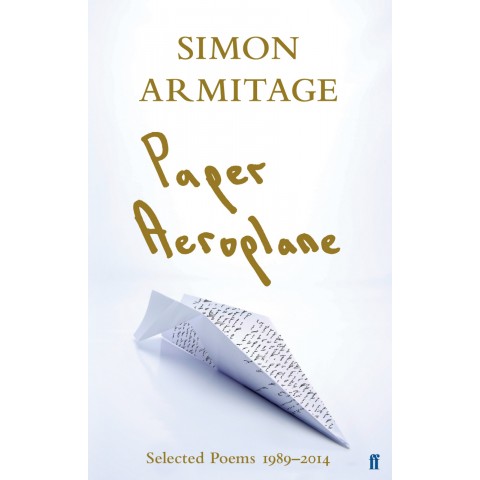
Paper Aeroplane: Selected Poems 1989 – 2014 is out now, published by Faber & Faber

